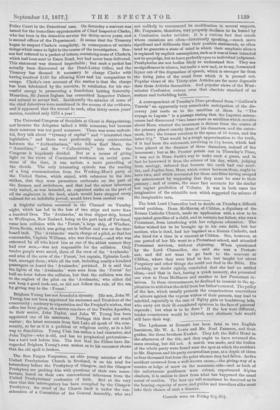The Rev. Fergus Fergusson, an able young minister of the
United Presbyterian Church in Scotland, is on his trial for heterodoxy before the Presbytery of Glasgow, and the Glasgow Presbytery are probing him with questions of their own manu- facture, based on their own conventional inferences from the United Presbyterians' confession of faith. But at the very time that this interrogatory has been compiled by the Glasgow Presbytery, the creed of the Church itself is under the con- sideration of a Committee of the General Assembly, who are
not unlikely to recommend its modification in several respects. Mr. Ferguseon, therefore, very properly declines to be bound by a Confession under revision. It is a curious fact that creeds whose omissions are often—historically speaking,—much more significant and deliberate than their positive statements, so often tend to generate a state of mind in which their emphatic silence is replaced by explicit assumptions, such as it was at least intended not to prejudge, but to leave perfectly open to individual judgment. Presbyteries are not bodies likely to understand this. They see no significance in silence, but make a new and, so to say, fermented liquor out of the dogmatism of speech, which is stronger far than the living juice of the creed from which it is pressed out. Popular views of the Thirty-nine Articles are far more dogmatic than those Articles themselves. And popular views of the West- minster Confession outrun even that obsolete standard of an austere and forbidding faith.






























 Previous page
Previous page